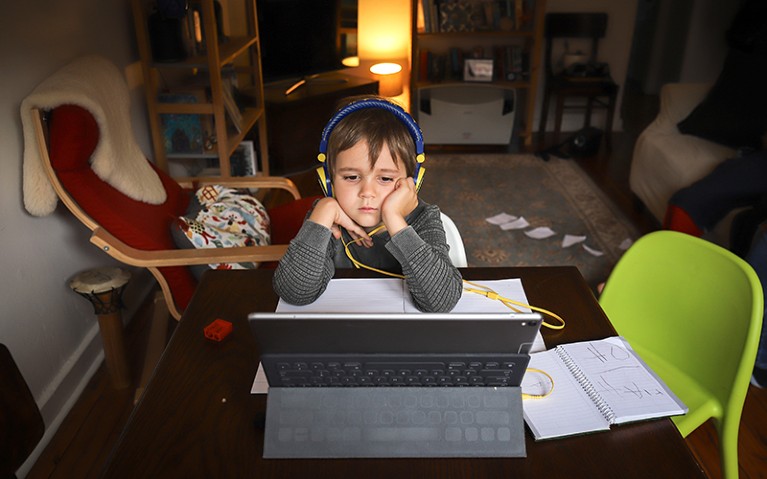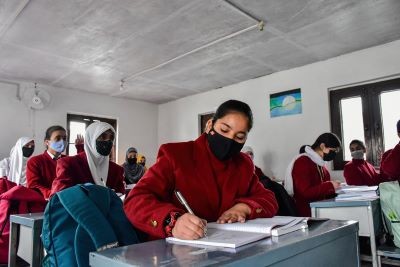COVID school closures cost children one-third of a year’s learning

When nations around the world locked down at the start of the pandemic, school closures were being common.Credit rating: David Gray/Getty
Little ones lost out on more than a person-third of a school years’ really worth of finding out in the course of the COVID-19 pandemic, an assessment has located. Their arithmetic competencies had been extra influenced than their reading qualities.
The research, released in Mother nature Human Behaviour on 30 January1, displays that initiatives to reduce more discovering losses immediately after the pandemic have been prosperous, but university-aged kids have not caught up on the decline of information and capabilities that they seasoned at the begin of the pandemic, for the duration of which faculty closures had been common.
“This is heading to be a genuine challenge for this technology that professional the pandemic in college,” suggests Bastian Betthäuser, a sociologist at the University of Oxford, Uk, and a co-writer of the examine. If not resolved, these studying losses will influence this generation’s good results in the labour market place, he adds.
Faculty closures
The COVID-19 pandemic triggered the greatest disruption to education and learning in history: 95{af0afab2a7197b4b77fcd3bf971aba285b2cb7aa14e17a071e3a1bf5ccadd6db} of the world’s pupil population was affected by university closures. According to the United Nations cultural firm UNESCO, universities suspended in-man or woman instructing for an common of 3.5 months for the duration of the pandemic.

COVID derailed discovering for 1.6 billion students. Here’s how faculties can assistance them catch up
The authors screened 5,997 peer-reviewed papers and preprint scientific studies on the pandemic’s impacts on instruction. They looked at discovering deficits — delays in studying progress, calculated using examination scores — as nicely as the loss of competencies and know-how that youngsters now had ahead of the pandemic. Their evaluation involved 291 learning-deficit estimates, claimed in 42 research from 15 higher- and center-revenue nations around the world: the United States, the United Kingdom, Australia, Belgium, Brazil, Denmark, Italy, Spain, Mexico, Sweden, Switzerland, South Africa, the Netherlands, Germany and Colombia.
The researchers calculated that, on average, college-aged small children across all grades missing 35{af0afab2a7197b4b77fcd3bf971aba285b2cb7aa14e17a071e3a1bf5ccadd6db} of a school year’s worth of understanding through the pandemic, and that these mastering gaps experienced not been recovered as of May 2022. The decline of expertise was worse in maths than in examining — maybe due to the fact parents are less capable to enable their youngsters with maths routines, the researchers speculate.
There are, nevertheless, some techniques that youngsters may possibly have developed all through the pandemic as a result of distant or hybrid instructing, claims Luka Lucic, a psychologist at the Pratt Institute in New York Town. “Kids ended up having super familiarized with the cyberspace and technological context, and will in the future be much much more native to the digital world.”
Strengthened inequalities
The discovering slowdown during the pandemic was not just an result of university closures, but a mix of things involving residence learning environments. These include things like “access to finding out devices, personal computers, digital means, getting a peaceful home to get the job done in … and financial insecurity among family”, says Betthäuser. “The pandemic bolstered discovering inequality at the world level.”
There was a absence of info from reduce-cash flow countries, but the research uncovered that small children from far more disadvantaged socio-economic backgrounds in superior- and center-money nations have knowledgeable larger sized finding out losses. The authors predict that the pandemic’s effects on discovering will be more critical for young children in poorer areas.
“Those students had been suffering in advance of the pandemic, they experienced far more throughout the pandemic, and now, as we’re striving to get our way out of this, they are likely to receive less than other folks to recover,” states Amanda Neitzel, a researcher at the John Hopkins School of Instruction in Baltimore, Maryland.
Policy initiatives to help little ones to recuperate shed mastering and abilities are urgently necessary, scientists say. “This is not going to be something that we capture up in a 12 months or two, when everything is back again to standard — I consider this is heading to be a ten years extensive,” suggests Neitzel. “We need to have to rethink education and make significant modifications to the framework and way that we do instruction to make this up.”
